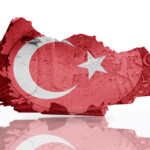Under the AKP and its (Muslim) brothers, religious behavior has surrounded and covered the public sphere from all sides. Secularism has become “abnormalized.” Although more or less 20 per cent of the society is still very secular, the general public sphere is now religious.
The second leg of the elections on May 28 will in essence be a vote about the “normalisation of fundamentalism.” The AKP has never allied itself with the far right to this extent—both because it has shifted towards radical Islam and because the centre-right against it is now united with the left. The AKP is therefore stuck with the fundamentalist right as the only area where it can expand.
If the elections are won, there will be no more political thresholds in front of Erdoğan. The centre-right alliance will probably disintegrate, and the Kurdish-Left alliance will be criminalized—as always—with the support of the opposition.
Two of the three aspects of Turkish secularism had already been severely damaged by the AKP and its alliances, first with the Gülen community and then with the Turkish-Islamic synthesis of the Grey Wolves.
The first aspect, the secularism of the state, i.e. the organic link between religious rules and the functioning of the state, was never established.
However, the role assigned to the The Directorate of Religious Affairs(Diyanet) after 2010 has far exceeded religious practices. The Diyanet is now the most important ideological apparatus of the state. It directs other ideological state apparatuses such as education, and communication. After the 28 May elections its sphere will increase even more.
Nevertheless, I do not think that after the elections there will be a return to the constitutional principle that “the religion of the Turkish state is Islam.” There will be no need for this, as I will explain below.
The second aspect is the secular nature of society. When I say a secular society, I mean one that has eliminated visibile religious behavior in the public sphere, or, even if this visibility continues, a society that has lost its religious meaning and turned it into folklore.
Under the AKP and its (Muslim) brothers, religious behavior has surrounded and covered the public sphere from all sides. Secularism has become “abnormalized.” Although more or less 20 per cent of the society is still very secular, the general public sphere is now religious.
After 28 May, alcohol bans should be expected to be introduced step by step. By the end of five years, alcoholic drinks are likely to be an ultra-luxury consumption good for the elite, in certain hotels and restaurants. So stock up on wine—it will age better.
The success of this new government, however, lies not in these two aspects, which have already been resisted, but in the third aspect of secularism, which has been able to preserve itself relatively well, namely in the legal framework.
The law in Turkey is, after all, secular. Sharia, the Islamic legal framework, is not yet legitimate.
I would argue that we are coming to the end of this period as well.
The first target will probably be the Civil Code. Under the guise of freedom, the civil code will be made more religious, step by step. This has already begun, with muftis given the right to perform civil marriages.
As the final stage, we may witness the legalization of polygamy, which is already widespread among the fundamentalists (who are partners in power), as well as the reorganization of the inheritance law.
A complete return to Sharia in civil law may not be easy, but it would not be surprising to see the revival of a “Mecelle-type” civil code, again hiding behind values such as “freedom” and “personal choice.”
The second target will be the education system, which is the habitat of pro-government fundamentalist movements and sects.
Again, in the name of freedom and diversity, the unity of education, which has already been compromised, will be abolished and some sects will be given the right to provide education under state control.
This has already begun with dershanes (preparatory schools) and madrasas. For this, the practice of private congregationalist schools in the West will be put forward as an argument.
In the centenary year, i.e. 2024, it would not be surprising if the Law on Tevhid-i Tedrisat (the 1924 law on unification of education) was abolished in order to “close the parenthesis” of a secular republic.
Following these two goals, or at the same time and in parallel, easier goals can easily be achieved.
A new banking law and the complete domination of the Gulf banking system with the prohibition of interest, or an Islamic Penal Code that meets the needs of the age, as advocated by the Muslim Brotherhood, could be easily passed through amendments to the penal code. Certainly, a referendum would suffice to bring back the death penalty.
Please don’t tell me I am exaggerating.
The so-called “exaggerations” of the past five years are part of daily life today.
This piece was originally published in Turkish in the RadarGazete and has been translated by FTP.
The views and opinions expressed above are the author’s and do not reflect those of the Free Turkish Press.


